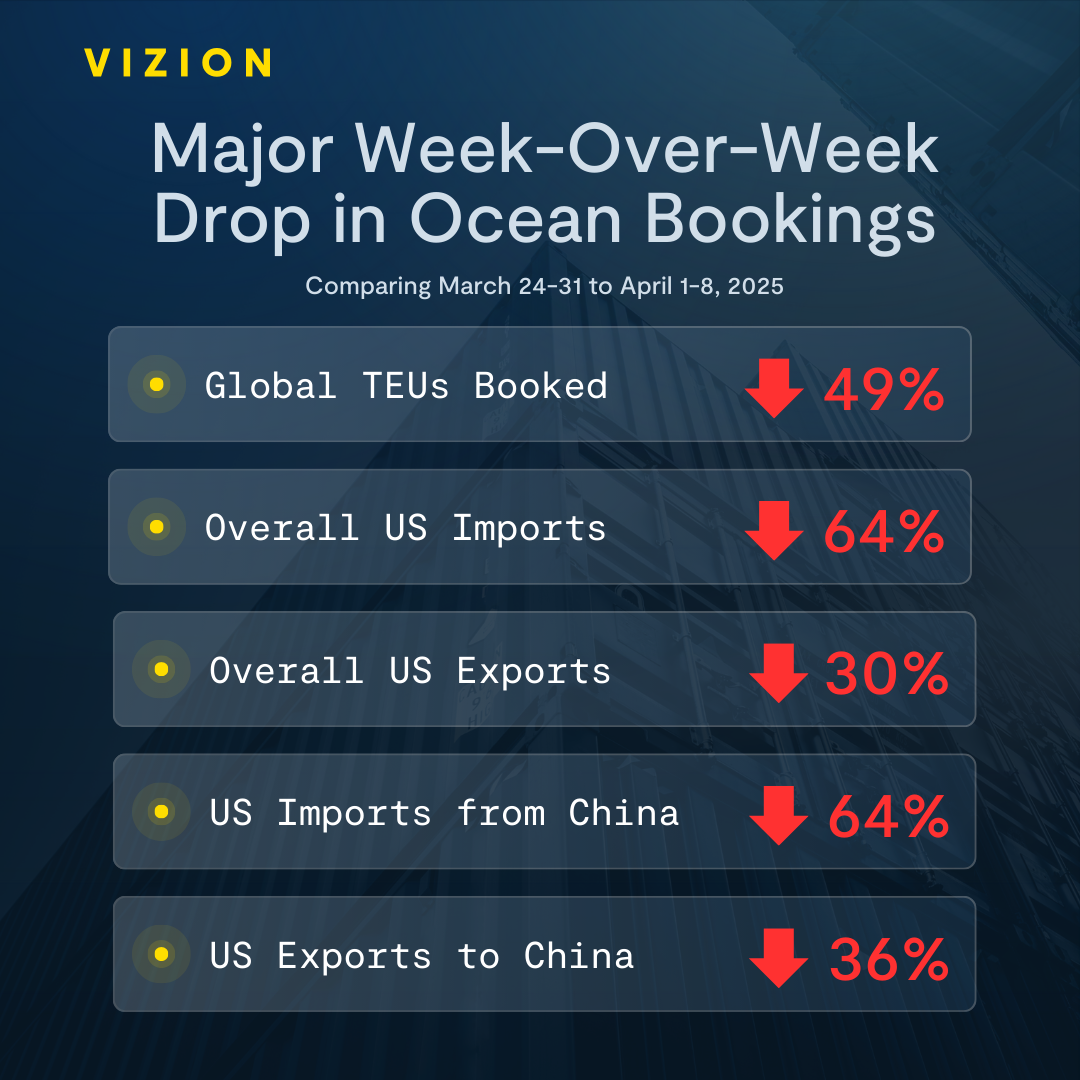US-China Trade War Opens "Super Bitcoin" Channel: US Import and Export Plummet by 64% and 30%
Facing trade route fluctuations, corporate finance departments may view Bitcoin as a hedging tool against fiscal intervention. US container booking data reveals that after the global trade war led by the US, trade volumes experienced a cliff-like drop, providing an early warning for systemic supply chain pressure.
According to Vizion's TradeView platform data, in the week ending March 31, total US import bookings plummeted by 64%. Imports from China declined by the same percentage, while exports to China dropped by 36%. This dramatic fluctuation reflects rapid market adjustments, with forward bookings across industries and product categories coming to a standstill.

The data, sourced from millions of container shipping records tracked daily by Vizion and Dun & Bradstreet, shows the US economy adopting a defensive posture to address changes.
In previous months, importers rushed to stockpile goods before tariff increases. Although there was year-on-year growth, bookings from January to March still decreased by 20%, ultimately freezing abruptly in April—with bookings for clothing, textiles, and basic industrial materials like plastics and copper plummeting by 59%.
Advance Stockpiling and Emergency Freeze
In the last week of March, as the US announced new tariffs on China and Beijing implemented reciprocal countermeasures, data showed a comprehensive supply chain contraction. Non-essential and tariff-sensitive goods like clothing and textiles dropped by over 57% week-on-week; industrial raw materials such as plastics and copper declined by 45% and 31% respectively, suggesting potential sustained material shortages for US domestic manufacturing. On April 10, the White House confirmed that cumulative tariffs on Chinese goods had reached 145%.
Vizion noted that container booking data serves as a leading indicator of supply chain changes, capable of capturing strategic hesitation months before goods arrive or economic data is revised. This forward-looking insight reveals the ongoing restructuring of the global trade system—shipping companies are reassessing procurement strategies and timelines while adapting to temporary trade rules across multiple regions.
Economic Shifts from a Bitcoin Perspective
The impact on the US economy extends far beyond logistics. Tariff shockwaves are creating friction across credit cycles, inventory management, and pricing systems, with uncertainties difficult to hedge through traditional financial instruments. While fiat remains the primary international trade settlement currency, violent fluctuations in trade behaviors and policies are triggering deeper concerns about settlement stability and long-term purchasing power—especially for multinational operations.
In contrast, Bitcoin, unbound by national policies, operates as an independent value ledger unaffected by tariffs or sanctions. When fiat systems frequently experience unpredictable distortions, asset holders may use it as a reserve option to protect against monetary politicization. Despite price volatility, Bitcoin's definitive monetary policy and ultimate settlement layer characteristics become particularly attractive during periods of high counterparty risk.
It remains premature to declare the US dollar system's replacement. However, macro trade friction is accelerating the exploration of non-sovereign settlement channels, particularly for countries facing secondary sanctions or capital controls. Logistics data revealing tariff policy impacts suggest supply chain participants might drive innovation in "value storage and transfer solutions under high-pressure environments".
Systemic Pressure and Bitcoin Adoption Theory
"Bitcoinization" is typically understood as retail or national-level adoption, but supply chain restructuring could equally achieve this. Corporate finance departments facing US dollar debt and geopolitically influenced trade routes—as demonstrated in the US and Asia—have strong motivations to explore hedging tools. While often unable to directly replace operational funds, Bitcoin can serve as an insurance asset, hedging against fiscal intervention's cascading impacts on procurement and pricing models.
Although Vizion's data doesn't show fund migration signs, it provides context for understanding "how capital preservation increasingly influences logistics decisions". Dramatic policy shifts like the April 4-5 tariff chain policies are shattering existing economic flow predictability. Correspondingly, Bitcoin's censorship-resistant and non-political characteristics have transcended ideological boundaries—emerging as a strategic hedging tool when traditional protective mechanisms fail to withstand macro policy impacts.
As Dun & Bradstreet insights suggest, shipping data is a mirror reflecting the future. April's booking cliff not only demonstrates logistics stagnation but also reflects the market's comprehensive response to economic disorder. Whether this will translate into strategic asset reallocation remains to be seen, but within the path dependency shaped by trade pressures, Bitcoin has become one possible response option.
The enhanced economic logic of "Bitcoinization" stems not from hype, but from system failure—when predictable systems encounter compound costs triggered by political variables, its value proposition naturally becomes prominent.







